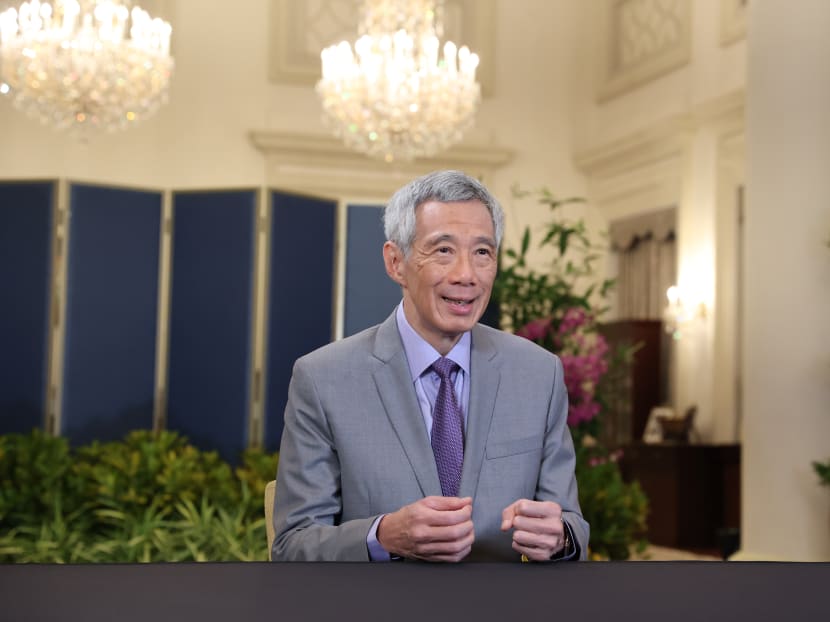2022 a ‘time of transition’ for Singapore, with economic recovery and expansion of travel expected: PM Lee

Singapore Prime Minister Lee Hsien Loong. (Photo: Ministry of Communications and Information)
SINGAPORE: The year 2022 will be a “time of transition” as the economy steadily recovers and Singapore reconnects with the rest of the world, Prime Minister Lee Hsien Loong said in his New Year message on Friday (Dec 31).
Expecting the gross domestic product (GDP) to grow by 3 to 5 per cent next year, Mr Lee said Singapore’s economy “should grow in step with global economic recovery”, barring fresh disruptions.
“We will progressively phase out emergency support measures as businesses revive, though a few sectors will take longer,” he added.
“We will safely expand cross‐border travel and reconnect with the rest of the world, Omicron permitting.
“We will also press on to bring in much needed migrant workers, and ensure international talents feel welcome and are able to complement Singaporeans.”
The Government is “planning ahead to achieve longer-term goals”, he added.
For instance, it will press on with industry transformation efforts to enhance existing strengths, and help companies restructure and workers upgrade their skills.
To keep workers productive and employable throughout their careers, it will keep investing in them together with businesses and the labour movement.
In addition, it will seek out new growth areas, including in the digital and green economies, building on current Smart Nation efforts and the Singapore Green Plan 2030.
Related:
DRASTIC MEASURES TAKEN TO SAVE LIVES, LIVELIHOODS
Mr Lee noted that the COVID-19 pandemic has been a “long and hard fight”.
Drastic measures were taken to protect lives and livelihoods, he said, citing the closure of Singapore’s borders for the first time as an example.
“We drew heavily on our past reserves to support workers and businesses. We innovated and adapted quickly to new ways of living, working and learning,” he said.
These were what kept Singapore’s healthcare system resilient and prevented “significant loss of life”, he added.
Government Budgets also “saved jobs and nursed the economy back to health”.
“At every step of the way, Singaporeans mustered strength and resolve to support one another. Many went above and beyond the call of duty.
“Our frontline and healthcare workers especially, have worked tirelessly round the clock.
“Businesses and everyday heroes, often in less visible places, have displayed courage and public spirit, and kept Singapore going and everyone safe.”
Mr Lee also highlighted achievements by Singaporean athletes, including swimmer Yip Pin Xiu’s two gold medals at the Tokyo Paralympics, as well as wins by Aloysius Yapp in pool-billiards and Shayna Ng in bowling.
“And the year ended on a high note – the Lions showed grit and determination in their Suzuki Cup run, and Loh Kean Yew became our first ever world badminton champion,” he said.
“In these challenging times, Team Singapore has inspired us with their tremendous spirit, and done us proud.”
However, Mr Lee cautioned that the fight against COVID-19 is not over, as the new Omicron variant has brought new uncertainties.
“Thankfully, our position is now greatly strengthened compared to two years ago,” he said.
“We have rolled out booster jabs and started vaccinating children below 12. We have also learnt to better manage the public health challenges while minimising the hit on our economy.
“As we brace ourselves for the impact of Omicron, we can be quietly confident that we will cope with whatever lies ahead.”
Mr Lee said that the Government’s immediate tasks go beyond managing COVID-19, noting that Singapore must generate new growth, new jobs and prosperity in a post-pandemic economy.
Much will depend on a stable global and regional environment, and central to this are the relations between the US and China.
“The differences between the two powers remain many and deep, but their recent high‐level engagements and practical cooperation on climate change are encouraging.”
For its part, Singapore will continue engaging partners “near and far”, Mr Lee said.
“We will continue to pursue trade liberalisation and regional integration for the benefit of our people, including through the Regional Comprehensive Economic Partnership, which comes into force on the first day of 2022.”
COVID-19 PANDEMIC “WILL NOT BE THE LAST CRISIS” TO TEST SINGAPORE
Describing the COVID-19 pandemic as a “crucible of fire for this generation of Singaporeans”, Mr Lee said it has “shown us the crucial importance of standing united as one”.
“This will not be the last crisis to try us; we will face more tests and trials in our nation building journey,” he said.
“We must strenuously resist powerful external tidal pulls that will strain fault lines in our society, and not allow them to divide us.
“As successive cohorts come of age with new perspectives and expectations, our societal norms will evolve. We should do this cautiously, maintaining the core values that make us Singaporean.”
To do that, Singapore must continue to strengthen its social consensus and shared identity.
Also crucial are the efforts to forge trust and mutual understanding – both between the Government and the people, and among Singaporeans of all backgrounds.
“Even amidst the pandemic, we did not neglect this crucial task,” he said.
“We have permitted Muslim nurses in public hospitals to wear tudung with their uniforms.
“We are actively strengthening fairness at the workplace and support for women, as well as improving protection and retirement adequacy for self-employed persons.”
“Going forward, we will strive to solidify our social compact – mending rifts deepened by the pandemic, uplifting those falling behind, enhancing safety nets for those in need, caring for the mental health of people, and meeting the needs of an aging society.
“That is the path to a fairer, more inclusive and more united Singapore.”
Related:
GST HIKE
In order for Singapore to realise its goals, it needs a vibrant economy and reliable and adequate revenues to carry out its social programmes, said Mr Lee.
As such, the Government will “start moving” on a planned Goods and Services Tax (GST) increase in Budget 2022, which will lay the basis for sound and sustainable government finances for the next stage of Singapore’s development.
“We have seen this need coming for some years. Now that our economy is emerging from COVID-19, we have to start moving on this,” he said.
Then-Finance Minister Heng Swee Keat had first announced in 2018 plans to hike GST by two percentage points, from 7 per cent to 9 per cent.
In his New Year message, Mr Lee added that Singaporeans have “stood together, supported difficult decisions, made many sacrifices, and come through safely” during the pandemic.
With that, the country can “confidently say that we have measured up as one people”, he added.
“In a crisis, everyone saw the need to make tough choices, and accepted hard policies for the common good,” he said.
“Looking ahead, confronted with longer-term challenges, we must maintain the same unity of purpose, fortitude of spirit, and willingness to accept difficult measures, in order to overcome them decisively and keep on progressing together.
“This is how we will build a Singapore where everyone has a place and no one is left behind,” he said.
“Let us stay united as one people and one Singapore – always looking ahead, securing our place in the world, and building an inclusive society that we can proudly call home.”









